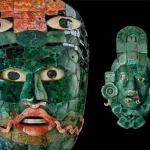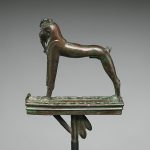The Unseen Grace: A Mother’s Dignity in the Age of Spectacle

The Burden of Birth:
Grace McDaniels was born in 1888, and from that first breath, she knew the world was not built for her. Her face, shaped by a rare and unforgiving condition, drew immediate, painful attention. As a child, the curiosity quickly curdled into cruelty—fingers pointed, whispers hissed, and doors were closed. She lived under a constant, cold stare, a living monument to human intolerance.

Yet, Grace possessed a fierce, quiet core. She never hid. To hide was to concede, and Grace McDaniels had no intention of conceding her right to exist.
In 1920, her life found its anchor: a son, George. Holding that small, perfect baby was the first time she felt truly beautiful, truly essential. But motherhood, for a woman marked as she was, came with a terrifying financial burden. She was an outcast in a society where appearance dictated opportunity. Factory jobs, domestic work, even simple street vending—all were barred by the fearful gaze of potential employers.
The Stage of Survival: The Great Depression

By the Great Depression of the 1930s, the economic landscape was brutal. Bread was currency, and starvation was a constant threat. Grace had a child to feed, a tuition to pay, and a future to protect. She realized there was only one place the world would pay to look at her: the side show circuit.
It was a harrowing choice. To step onto the platform was to willingly invite the very gaze that had wounded her all her life, but now, it was a gaze exchanged for coin. It was not a path to fame; it was a path to survival.
Grace took the stage. She was billed, often cruelly, as “The Mule-Faced Woman.” Every night, she stood under harsh lights, the rope barrier inches from her face, enduring the loud gasps, the snide jokes, and the cold, unblinking scrutiny of the crowd.
The Action of Endurance: The true action wasn’t a fight or a chase; it was the daily, resolute action of standing still. Grace would meet the crowd’s stare directly, her posture erect, her hands calmly folded. She never flinched. She endured the flash of a cheap camera, the rude question thrown by a drunken sailor, and the panicked tears of a child dragged too close by a morbid parent. She transformed the spectacle into a job, her presence radiating a dignity that seemed misplaced in the tawdry tent, but was absolutely real.
A Lesson in Dignity

The money she earned—pennies, dimes, sometimes a rare dollar—was meticulously saved. It paid for food, for shoes, and for George’s schooling.
For George, the world outside the carnival tents was different. He saw the looks his mother received, heard the whispers. But within their small, shared trailer, he saw only Mama.
Grace was relentless in her lessons. She taught him to read not just words, but the hearts behind them.
“They will look at you, son,” she would say, her eyes fixed on his. “They will see a flaw in their world, not in you. But we are McDaniels. We stand straight.”
Her most important lesson was simple: “Dignity is not measured in appearances. It is measured in how you treat yourself and how you treat others.”
She ensured George was educated, well-mannered, and, crucially, kind. He never returned the world’s cruelty. He understood his mother was a queen cloaked in an unfortunate destiny, earning their keep with unyielding strength.
The Legacy

The world saw an anomaly, an act of nature that violated their sense of order. The posters screamed her outlandish stage name.
But George only ever saw his mother. He never saw the anomaly; he saw the sacrifice. He saw the woman who, despite being rejected by every conventional job, took the most humiliating one to ensure he was fed.
Grace McDaniels’ legacy isn’t captured in the stark, unnerving images that remain of her. Her legacy is the strength she demonstrated nightly on that flimsy stage, the unbreakable spirit she instilled in her son, and the ultimate success of raising a decent, educated man in an indecent, judgmental world.
She proved that the highest form of human worth has nothing to do with symmetry or fortune. It is the ability to stand tall and provide, to love fiercely, and to teach kindness, even when the world refuses to look back with respect. Her life is a permanent, powerful reminder: Everyone deserves respect, even when the world doesn’t know how to look at them.











